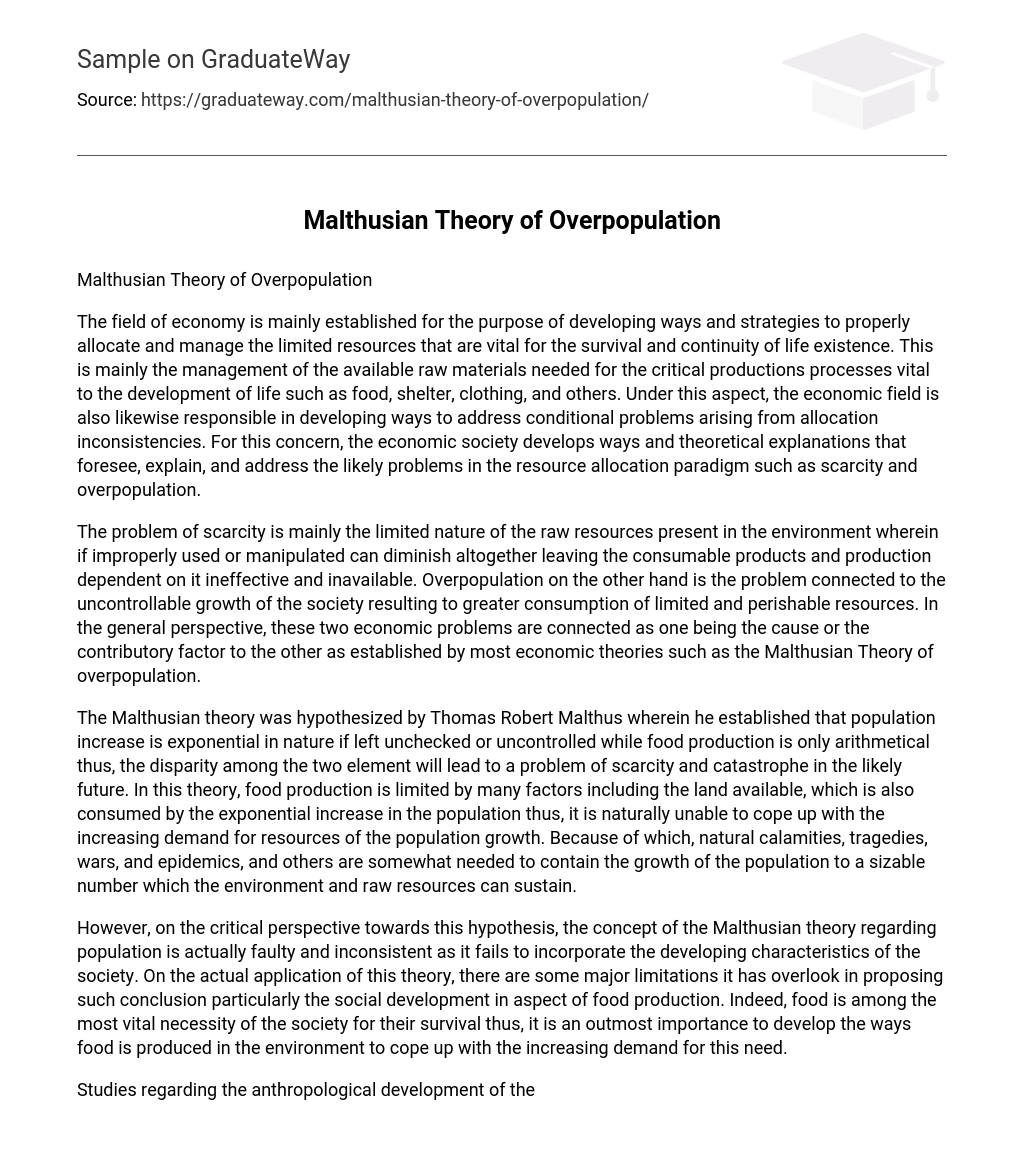Malthusian Theory of Overpopulation
The field of economy is mainly established for the purpose of developing ways and strategies to properly allocate and manage the limited resources that are vital for the survival and continuity of life existence. This is mainly the management of the available raw materials needed for the critical productions processes vital to the development of life such as food, shelter, clothing, and others. Under this aspect, the economic field is also likewise responsible in developing ways to address conditional problems arising from allocation inconsistencies. For this concern, the economic society develops ways and theoretical explanations that foresee, explain, and address the likely problems in the resource allocation paradigm such as scarcity and overpopulation.
The problem of scarcity is mainly the limited nature of the raw resources present in the environment wherein if improperly used or manipulated can diminish altogether leaving the consumable products and production dependent on it ineffective and inavailable. Overpopulation on the other hand is the problem connected to the uncontrollable growth of the society resulting to greater consumption of limited and perishable resources. In the general perspective, these two economic problems are connected as one being the cause or the contributory factor to the other as established by most economic theories such as the Malthusian Theory of overpopulation.
The Malthusian theory was hypothesized by Thomas Robert Malthus wherein he established that population increase is exponential in nature if left unchecked or uncontrolled while food production is only arithmetical thus, the disparity among the two element will lead to a problem of scarcity and catastrophe in the likely future. In this theory, food production is limited by many factors including the land available, which is also consumed by the exponential increase in the population thus, it is naturally unable to cope up with the increasing demand for resources of the population growth. Because of which, natural calamities, tragedies, wars, and epidemics, and others are somewhat needed to contain the growth of the population to a sizable number which the environment and raw resources can sustain.
However, on the critical perspective towards this hypothesis, the concept of the Malthusian theory regarding population is actually faulty and inconsistent as it fails to incorporate the developing characteristics of the society. On the actual application of this theory, there are some major limitations it has overlook in proposing such conclusion particularly the social development in aspect of food production. Indeed, food is among the most vital necessity of the society for their survival thus, it is an outmost importance to develop the ways food is produced in the environment to cope up with the increasing demand for this need.
Studies regarding the anthropological development of the civilization have shown that the means of food procurement of the people has indeed developed. World history has shown that food production has evolved from the Neolithic to the neocaloric wherein from the basic means of foraging, hunting and planting, modern ways of production such as advanced agriculture and capitalism have been developed to optimize the use of the available resources (179-180). Development in the system and the inclusion of technological advancement has modernized the food production system resulting to wider agriculture, harvest, and more reliable means of storage. This indeed has increased the yield of food production enabling the society to sustain their needs and properly utilize the available resources in the environment. Further development has opened the window for green revolution, which increased the production output with the application of modern machineries to aid the food production process in farming and fishing (183). Replacing the traditional means that is slower and has lower output, the society has able to optimize further their production processes through maximizing their usage of the environmental resources particularly the time and space factor. Further development has shown signs for the opening of Green Revolution II wherein the advancement in the field of genetic engineering posts potential to increase the food production possibility in the future (185).
The economic development in the food production means of the society has resulted to the optimum use of the available resources in the environment thus, resulting to increase in the yield produced, shorter time gap, and maximizing the potential of the available lands. Because of which, the economic production system of the society has able to transformed the likely arithmetical nature of supply enabling them to cope up with the demands of the exponential increasing population making the basis of the Malthusian theory to be imperfect. Indeed, the theory of Malthus regarding the correlation of population and supply is correct however, he has likely overlook the development potential of the society in improving their traditional processes and functions in attaining their basic needs towards their survival and life continuity.
Bibliography
Hunger, Poverty, and Economic Development. Chapter Six. Pp. 177- 186.





